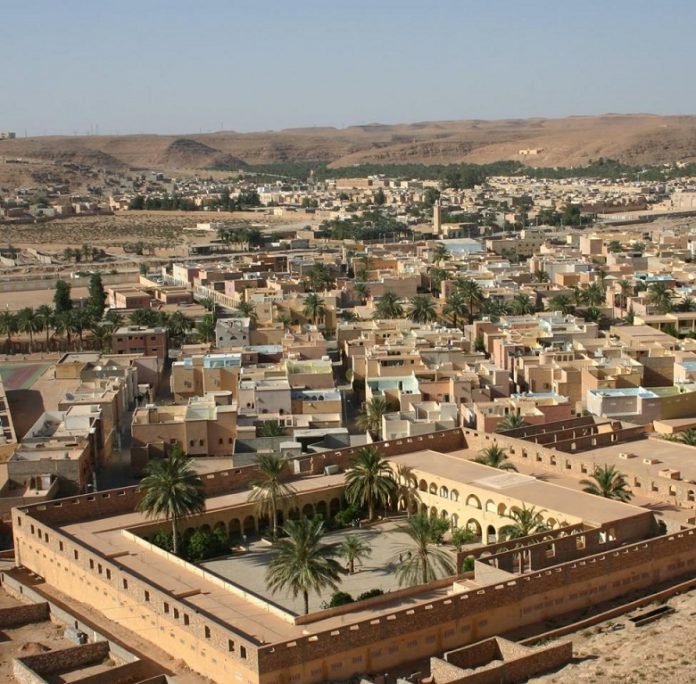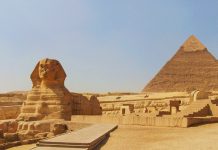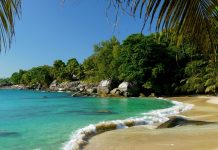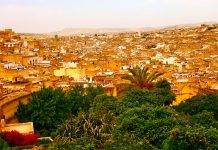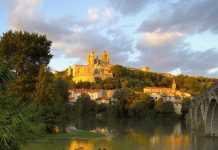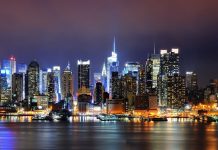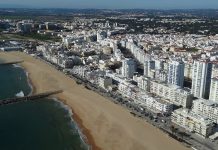Algeria is the largest country in area, in Africa, also in the Mediterranean, and the tenth largest in the world.
On the northeast, it is bordered by Tunisia, Libya to the east, and on the west by Morocco, and the Western Sahara, Mali and Mauritania, and by Niger on the Southeast. The Mediterranean Sea is Algeria’s Northern border.
Algeria was the home of many ancient cultures, including the prehistoric Aterian and Caspian people. In the past, many famous cultures took up their residence in the land, such as the Berbers, the Numidians, Carthaginians, Romans, Vandals, Byzantines, and Turkish Ottomans.
One of the more famous was the Carthaginians who from as early as 600BC had settlements along the Mediterranean coast. With the city of Carthage as its centre of trade, the influence of the Carthaginians spread far and wide. By this time the Berbers in the centre of the country and the Carthaginians were coming into conflict. With the expansion of the influence from Carthage, this resulted in military domination of the Berbers.
When we think of Carthage, we think of Hannibal, one of the greatest generals of all time, who crossed the Alps with his war elephants and antagonised the Romans for years. Eventually Rome conquered Carthage and the city was destroyed. In the aftermath, Berber kingdoms emerged, but the Romans dominated the area for several centuries until the conquest by the Muslims during the 7th century. After the Muslim conquest, many of the Berber inhabitants converted to Islam.
Spain made attempted to rule Algeria in the early 16th century, but they never really gained a foothold to the point that it could be said that Spain was a conquering opponent. In 1510 the Spanish decline began, never to be resurrected.
In the mid to late 1500’s, the Ottoman Turks held sway over the region until the 1830’s, and during that time various coups, assignations, and power struggles ensued. One of the more notable historic episodes was that Algeria was the home of the Barbary pirates who played havoc all over the Mediterranean by capturing merchant ships, invading cites in the interest of capturing slaves and stealing what they could.
One of their favourite tactics was to raid the European coastal towns to capture Christian slaves, who could then be resold at the slave markets in Northern Africa and the Ottoman Empire. It is estimated that between the 16th to the 19th century, 1 million to 1.25 million Europeans were captured as slaves by these pirates.
When the piracy affected American shipping, America fought back resulting in the Barbary Wars from 1801 to 1815. The famed Stephen Decatur was an instrumental leader in defeating the pirates and the forces of the pirates were weakened. A British naval fleet then forced a treaty from the pirates that they would cease the practice of enslaving Christians.
In 1830, the French captured Algiers, and thus began a long French influence over the area. Between 1825 and 1847, some 50,000 French people arrived in Algeria, and the area was administered by France. A gradual dissatisfaction in the Muslim population began to fester, as they lacked any political influence or status economically. A ruling French elite had emerged and tensions had risen to a peak. In 1954, the first waves of the Algerian War, as it was called, began.
It is estimated that 30,000 to 150,000 people were killed by lynch mobs in Algeria. The conflict was long and bloody until 1962 when Algeria gained its Independence.
Reforms were instituted and a gradual process of modernisation and industrialisation commenced. In the 1970’s, a new president Chadli Bendjedid introduced liberal economic reforms and promoted a stronger policy to bring in a more fundamentalist, radical Islamic way of life. Arabic was taught in schools and the promotion of Arabisation in the general society was underway, sowing the seeds of political Islamism.
The discovery and industrialisation of the oil industry in Algeria helped and hurt the country. It helped in the sense that it brought new income to Algeria, but it hurt when, in the 1980’s, the oil prices crashed, and it threw Algeria into an economic tailspin. It was then that a multi-party political system was set up, but there was still political strife well into the late 1990’s. Since then, Algeria has struggled with its leadership and political divergences, but to its credit the leadership has had a direction towards bettering the overall living and economic conditions for the people. A number of reforms have been passed in order to ease the political and modernise the country with efforts to raise the living standards.
As stated, Algeria is the largest country in Africa, and the Southern part of the country is made up mostly of the Northern Sahara Desert. Moving towards the northern part of the country, one finds the huge mountain ranges of Aures and Nememcha, which cover the vast North-eastern part of the country ending at the border of Tunisia. The Tell Atlas is a fertile strip of land that runs along and south of the Mediterranean coast and enjoys adequate rainfall. The rest of the country going southwards is hot to very hot finally reaching the Sahara.
The head of State of Algeria is the President, who is elected for a five-year term, and is limited to two five-year terms. Officials who are “elected” really have no power, and instead there is a group of unelected civilian and military individuals called “decidiurs” known as “the power”. It is here where decisions on running the country are made. Algeria as a regime is authoritarian in accordance with the Democracy Index of 2010. In The Freedom of the Press Report of 2009, Algeria was given a rating of “Not Free.”
The economy is largely based on oil, but is also driven by public sector spending and governmental construction. The unemployment rate in 2011 was 10%. Like many countries in the region, Algeria is struggling economically, but hopes to rectify this in the future.

